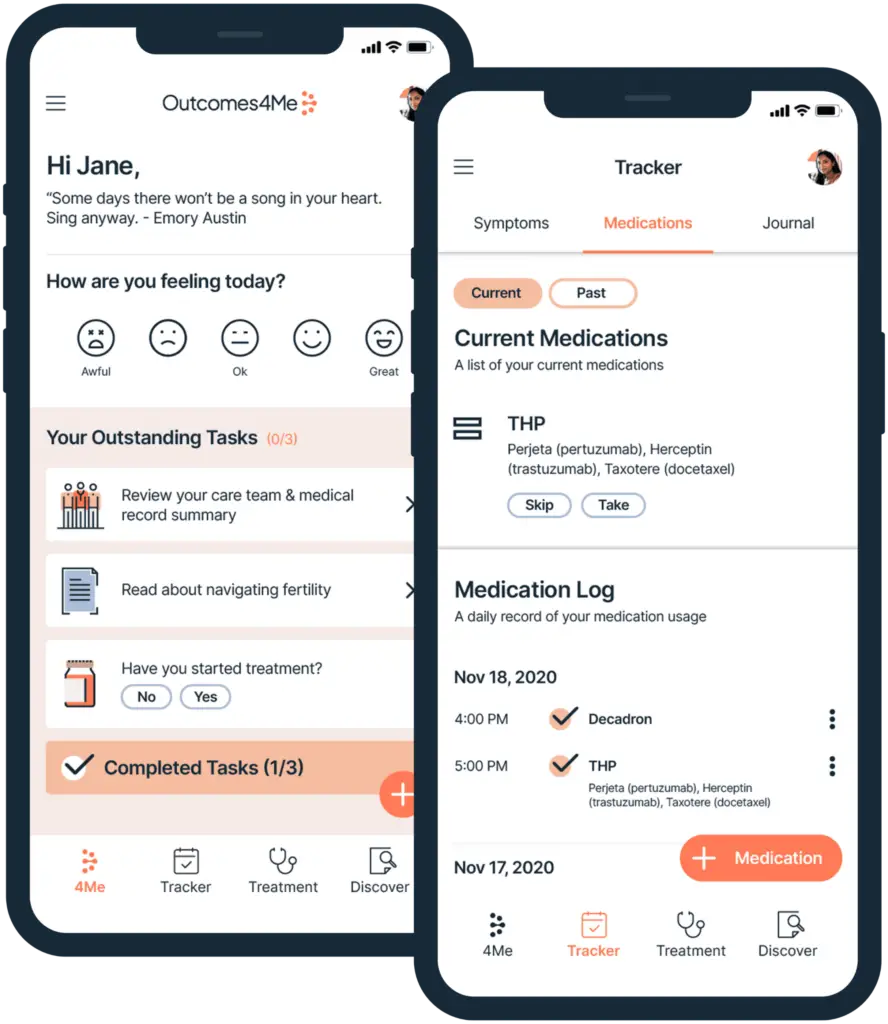Outcomes4Me Secures $21M in Funding Learn more >>
Outcomes4Me Secures $21M in Funding Learn more >>
Suzanne Garner
Cancer Survivor, Outcomes4Me User

We’re the only non-metastatic stage 1 breast cancer app that integrates with the NCCN Clinical Practice Guidelines in Oncology (NCCN Guidelines®), from the not-for-profit alliance of 33 leading cancer centers. The NCCN Guidelines® include comprehensive guidance related to all FDA-approved treatment options.
We gather non-metastatic stage 1 breast cancer treatment recommendations typically meant for oncologists and use Artificial Intelligence (AI) to translate that information so you can understand it, putting you in control. With this knowledge, you can feel empowered to make the best medical decisions with your care team.
With our free non-metastatic stage 1 breast cancer app, you’ll get:


Gain direct access to personalized treatment options so you can have more informed conversations with your care team.

Rely on us to help your patients get access to the best non-metastatic stage 1 breast cancer care and resources, and save time in your day. We’re here to help and won’t ever get in the way.

Accelerate patient access to your treatments and expand the reach of your non-metastatic stage 1 breast cancer research and clinical trials.
Get all the information you need to take a more active role in treating your non-metastatic stage 1 breast cancer.












According to NCI data, about 20% to 30% of women and people assigned female at birth with early-stage cancer later develop metastatic breast cancer.
In many cases of Stage 1 breast cancer, chemotherapy may not be routinely recommended, especially if the tumor is small, hormone receptor-positive, and has a low risk of recurrence.
The decision to use chemotherapy for Stage 1 breast cancer depends on various factors, including the specific characteristics of the cancer, such as hormone receptor status, HER2 status, and other risk factors, as well as individual patient considerations.
The National Comprehensive Cancer Network (NCCN) provides guidelines for breast cancer treatment, and these guidelines are based on the latest evidence and expert consensus. According to the NCCN guidelines, adjuvant chemotherapy may be considered for certain cases of Stage 1 breast cancer based on specific factors, such as high-risk features.
Stage 1 breast cancer is generally considered an early and highly treatable stage, with a favorable prognosis for most individuals. Survival rates for Stage 1 breast cancer are typically high, particularly when compared to more advanced stages of the disease.
The American Cancer Society provides information on breast cancer stages, and they emphasize that Stage 1 breast cancer is localized, meaning the cancer is limited to the breast and, in some cases, nearby lymph nodes. The 5-year relative survival rate for localized breast cancer is quite high, often close to 99%, which suggests a high likelihood of successful treatment and long-term survival for many individuals.
The vast majority of individuals with Stage 1 breast cancer survive at least five years after diagnosis.The 5-year relative survival rate for localized (Stage 1) breast cancer is very high, often close to 99%. Keep in mind that these statistics are general estimates and do not account for individual variations.
Survival rates for Stage 1 breast cancer can vary based on multiple factors, including the specific characteristics of the cancer, the individual’s overall health, and the effectiveness of the treatment. It’s important to note that survival rates are statistical estimates and do not predict the outcome for any individual case.
The risk of recurrence for Stage 1 breast cancer is generally lower compared to later stages. However, there is still a potential for recurrence, and it can occur months or years after the initial treatment.
The likelihood of Stage 1 breast cancer returning, known as recurrence, varies based on individual factors and the characteristics of the cancer. Recurrence rates can depend on various factors, including the type of breast cancer, tumor characteristics, and the effectiveness of the initial treatment.
Regular follow-up care, including imaging tests and doctor visits, is typically recommended to monitor for any signs of recurrence.
Yes, there is a possibility of Stage 1 breast cancer returning, known as recurrence. The risk of recurrence can vary based on individual factors, including the specific characteristics of the cancer, the effectiveness of the initial treatment, and other patient-related factors.
While the risk of recurrence is generally lower for earlier stages of breast cancer, including Stage 1, there is still a potential for cancer cells to survive and grow, leading to a recurrence. Recurrence can occur locally in the breast or chest wall, in the lymph nodes, or in other distant organs.
The best treatment option for Stage 1 breast cancer depends on various factors, including the specific characteristics of the cancer, the individual’s overall health, and preferences. Treatment options may include surgery, radiation therapy, and, in some cases, hormone therapy or chemotherapy. The choice of treatment is typically determined through discussions between the patient and their healthcare team.
The National Comprehensive Cancer Network (NCCN) provides guidelines for breast cancer treatment based on the latest evidence and expert consensus. These guidelines take into account factors such as tumor size, lymph node involvement, hormone receptor status, and human epidermal growth factor receptor 2 (HER2) status.
https://my.clevelandclinic.org/health/diseases/21497-metastatic-breast-cancer
Source: National Comprehensive Cancer Network.
https://www.nccn.org/patients/guidelines/content/PDF/breast-invasive-patient.pdf
Source: American Cancer Society
https://www.cancer.org/cancer/types/breast-cancer/understanding-a-breast-cancer-diagnosis/breast-cancer-survival-rates.html
Source: American Cancer Society
https://www.cancer.org/cancer/types/breast-cancer/understanding-a-breast-cancer-diagnosis/breast-cancer-survival-rates.html
Source: American Cancer Society.
https://www.cancer.org/cancer/types/breast-cancer/living-as-a-breast-cancer-survivor/second-cancers-after-breast-cancer.html
Source: American Cancer Society.
https://www.cancer.org/cancer/types/breast-cancer/living-as-a-breast-cancer-survivor/second-cancers-after-breast-cancer.html
Source: National Comprehensive Cancer Network. (2023). https://www.nccn.org/patients/guidelines/content/PDF/breast-invasive-patient.pdf
By clicking the “Subscribe Now” button you’re agreeing to our Terms of Service and Privacy Policy.